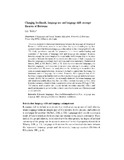Changing livelihoods, language use and language shift amongst Basarwa of Botswana

View/
Date
2009-08Author
Mafela, L.
Publisher
Routledge. http://www.informaworld.comType
Published ArticleMetadata
Show full item recordAbstract
This study explores the historical relationship between the languages of Basarwa of
Botswana and Setswana, in order to understand the dynamics underpinning their
appropriation of the Setswana language, as they adjust to their changing livelihoods.
The study contributes towards the promotion of a better understanding and
awareness of the issues of language shift and language use amongst Basarwa.
Basarwa occupy the lowest rungs of the social ladder in Botswana. Due to the close
association between the status of the people and the status of their language, the
Basarwa languages accordingly rank low in use and status nationally (Andersson &
Janson, 2004, p. 118; Batibo, 2005, p. 71). Like the other minority languages, the
Basarwa languages also have a low status and a low prestige in education and in
written discourse. Moreover, the study observes that in their quest to mediate their
socio-economic marginalisation, Basarwa have had to appropriate Setswana, the
dominant national language for survival. However, their appropriation of the
Setswana Language has had deleterious effects on their languages and overall sociocultural
identity. In this context, the nationally dominant Setswana language not
only dominates public discourse, but also official spoken discourse as well, while
English dominates official written discourse (Andersson&Janson, 1993, pp. 83 84).
The sources used to guide this analysis include secondary material, official and
unofficial documents, as well as the author’s own observations, as a Motswana and
an educationist.
Collections
Related items
Showing items related by title, author, creator and subject.
-
Language maintenance or shift? attitudes of Bakalanga youth towards their mother tongue
Letsholo, R. (Routledge (Taylor and Francis)/www.routledge.com, 2009)This article reports the findings of a study whose objective was to investigate whether there was a likelihood of a language shift (or loss) from Ikalanga (a minority language spoken in Botswana) to either Setswana or ... -
Investigating language vitality in some parts of North Eastern Botswana
Mogara, Budzani; Kari, Ethelbert; Kadenge, Maxwell; Molefhi, Dipogiso (University of Botswana, www.ub.bw, 2017)The main objective of this article is to investigate the level of language vitality in Botswana on the basis of patterns of language use, transgenerational language transmission, language attitudes and ethno-cultural ... -
Teachers’ strategies of teaching primary school mathematics in a second language: a case of Botswana
Kasule, D.; Mapolelo, D. (Elsevier, http://www.elsevier.com/wps/find/homepage.cws_home, 2005-11)This paper reports the results of a study of primary school mathematics teaching in northern Botswana in order to highlight the strategies teachers use in bi/multilingual classrooms. Questionnaire and interview data ...
